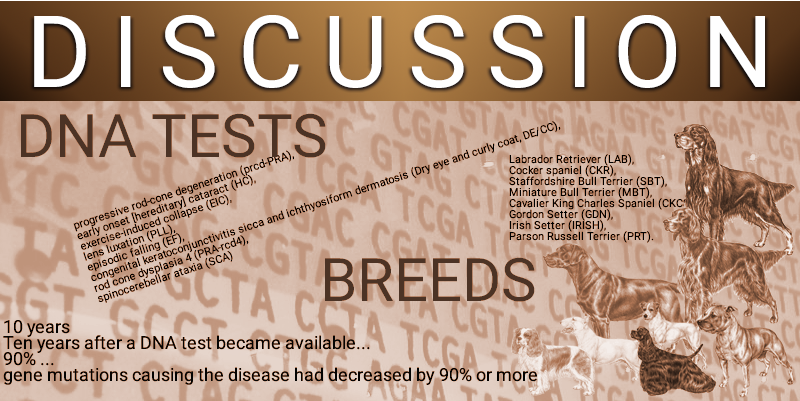Nearly 20 Years of DNA Testing – What Can We Learn?
Ian Seath, a great friend and collaborator of IPFD has provided a clearly and thoughtfully profiled an article from our Partners at The Kennel Club in the UK in his post:
NEARLY 20 YEARS OF DNA TESTING – WHAT CAN WE LEARN?
Ian does a great job of summarizing and highlighting the material in this important paper and I will let you read his coverage, and, as he suggests, the original paper:
- "I don’t want to dwell on the detail of the research; you can read that for yourself, here: https://goo.gl/PiQmMF – I want to discuss how and why this paper might be important. The study covers the results of 8 DNA tests in 8 breeds for the period 2000 to 2017. 2 of the DNA tests applied to 2 breeds, resulting in 10 test+breed combinations. The key metric used to measure progress was the Mutation Frequency ...".
In essence, for these tests in these breeds, the authors, Tom Lewis and Cathryn Mellersh, respected geneticists, go beyond the findings in specific dogs to calculate a broader impact on inheritance. The paper shows the tremendous potential for validated tests, used appropriately to positively impact the health of breeds. Ian's suggestions on how The KC could take these findings further by considering how to incorporate in registration and breeding strategies are on point.
In his section on "Wider Implications?" Ian also highlights some of the cautions that must also be taken into consideration, and further, says:
- "There are over 700 inherited disorders and traits in dogs, of which around 300 have a genetically simple mode of inheritance and around 150 available DNA tests. This tells us that we should not rely on DNA testing to solve the “problem” of diseases in pedigree dogs."
Building on this, and without detracting in any way from the research, its impact or Ian's excellent discussion, I want to stress further caution. Accepting that this is strong evidence that "DNA testing works!" we must be clear that this has been shown for these tests in these breeds and our enthusiasm must not expand to include all genetic testing, across the board, as being proven as impactful by this study. These are primarily simply inherited, very specific, well-characterized, but relatively rare conditions with well-validated tests. Certainly we are optimistic that there are now, and will be more, test-by-breed-by-condition combinations that will also support health strategies and breeding decisions. But it is extremely important to remember that only a small proportion of the conditions affecting dogs will fall into this category, even a small proportion of those for which genetic tests are or will be available. In terms of perspective, the IPFD Harmonization of Genetic Testing in Dogs (HGTD) database lists over 250 genetic tests marketed to over 400 breeds/varieties.
So I echo Ian's recommendations that even as we take this as good news, we:
- look to researchers and breed advisors to continue their work to not only identify potentially useful tests but also to monitor them as they are used to determine their impact
- we continue to educate consumers and breeders on the complexities of genetic testing, as well as, the realistic benefits and limitations of genetic tests and testing
- and we promote and support balanced, 'Big Picture' development of breed-health strategies that consider not only genetic testing but all other available tools to help define the health and disease picture within breeds as well.
The IPFD HGTD is in place to support genetic counselling; and the Expert Panel development to provide informed advice and the Health Strategies Database for Dogs including an interactive resource supporting that Big Picture view are coming soon to help all stakeholders do their best for dogs and their owners as we navigate the complexities of dog health and welfare.
Kudos again to Drs. Lewis and Mellersh, and The KC for stellar work and to Ian Seath for his insightful commentary. This is progress – over 20 years. One can be optimistic that there will be many more advances in the next 20 years if we focus on both the details and the broad perspective.
See also: New Research blog on the same article.
Blog Disclaimer
The contents of this blog are for informational purposes only and represent the opinion of the author(s), and not that of the International Partnership for Dogs (IPFD). This is not intended to be a substitute for professional, expert or veterinarian advice, diagnosis, or treatment. We do not recommend or endorse any specific tests, providers, products, procedures, opinions, or other information that may be mentioned on, or linked to from this blog.


Recommended Comments